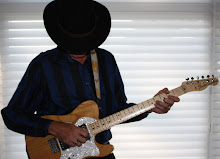It's interesting how people define different musical genres.
Does a country song have to have fiddles? If it's missing fiddles, what is it? (Bad rock, according to Tom Petty, but I don't think he meant it.)
Does a prog rock song have to have multiple time and key signature changes?
Can't a blues song have more than three chords?
Does rock and roll have to be in 4/4 time?
The problem with labels, of course, is that they are restricting. To me, the best artists have always borrowed a bit here, a bit there, studied this, appreciated that - and picked up bits and pieces along the way to crafting their own unique sound. None of them have been rigid and exclusive in what music they liked. Just the opposite; they've explored, included and cross-pollinated.
Sure, each genre and sub-genre has its home base and dominant characteristics, but great artists are always mixing things up and taking us somewhere new, to a place where labels don't matter.
Does a country song have to have fiddles? If it's missing fiddles, what is it? (Bad rock, according to Tom Petty, but I don't think he meant it.)
Does a prog rock song have to have multiple time and key signature changes?
Can't a blues song have more than three chords?
Does rock and roll have to be in 4/4 time?
The problem with labels, of course, is that they are restricting. To me, the best artists have always borrowed a bit here, a bit there, studied this, appreciated that - and picked up bits and pieces along the way to crafting their own unique sound. None of them have been rigid and exclusive in what music they liked. Just the opposite; they've explored, included and cross-pollinated.
Sure, each genre and sub-genre has its home base and dominant characteristics, but great artists are always mixing things up and taking us somewhere new, to a place where labels don't matter.
And that's a good thing.

No comments:
Post a Comment